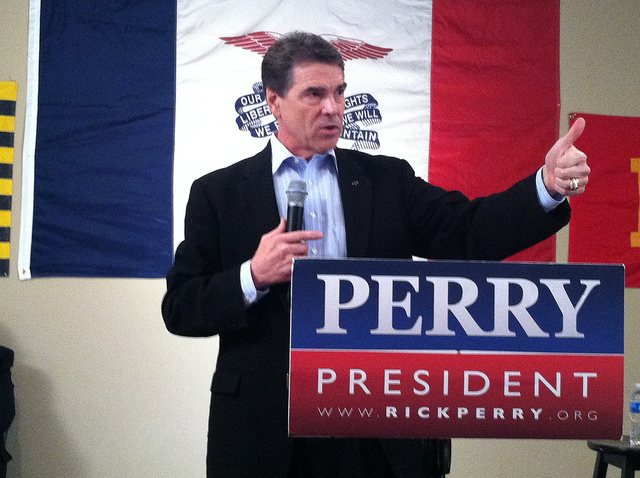
Christine Gianakis, a Political Science and Communications major is in her second year as a columnist for The Montclarion.
Rick Perry announced on Sept. 11 that he would not be seeking the office of the presidency, making him the first candidate to drop out of the race. He leaves behind 16 hopefuls in the GOP primary, all of whom are fighting for the same votes among the same constituency.
The suspension of his campaign is due in part to a lack of funding from his super PAC along with his poor polling numbers. In the polling data averaged for the September CNN debate lineup, Perry came in at a mere 1.814 percent with four candidates trailing behind him.
Candidates polling less than 2 percent should follow Perry’s lead and call it quits. Too many clowns in one circus will inevitably draw attention away from the rest of the show.
The purpose of the primary election is to weed out weak candidates and to allow only the strongest to survive. Simply put, a candidate that is unable to poll higher than 2 percent among their own constituency is certainly not going to be able to pull votes across the aisle next November. Americans want a candidate who will unite their party and the country and Perry was not the man for the job.
“I step aside knowing our party is in good hands as long as we listen to the grassroots, listen to that cause of conservatism,” Perry said. “If we do that, then our party will be in good hands.”
Fox News anchor Bret Baier opened the last debate by asking those on stage if anyone would be “…unwilling tonight to pledge your support to the eventual nominee of the Republican party and pledge to not run an independent campaign against that person.” Baier was asking about party loyalty.
The question was undoubtedly targeted at Donald Trump who is feared to run as an independent if he does not win the primaries, but it was also a stab at the rest of the candidate’s loyalty to the Grand Old Party. Baier was reminding them that the race for the White House is not a one man show.
Yes, voters need options and should have the opportunity to get to know several candidates before making their own decisions. But, should Republican voters really be expected to weed through 16 people running for the same office, with the same platform and roughly the same experience? The staggering amount of candidates is turning the general public away from politics and encouraging the passive political mindset of “I’ll pay attention when there are only two candidates left.”
On the afternoon of his departure from the candidacy, Perry chose to pledge his allegiance to his party rather than to himself. He did primary voters a favor by eliminating one space from the clown car, allowing room for the others to speak about their platforms and not just each other.
This summer has been a collection of name calling and mudslinging among candidates desperate to stand out in the news. It is my sincere hope that as the playing field shrinks, the substance and intellect will grow. A shortened roster of candidates will allow those running to spend more time developing clear objectives for the office and strong stances on the issues.
Perry closed his remarks sounding like a true crusader to the conservative cause. “I give you this news with no regrets” said Perry. Time will tell, however, if the remaining 16 candidates will be able to say the same thing about their decision to remain in the race come Election Day.



